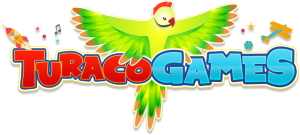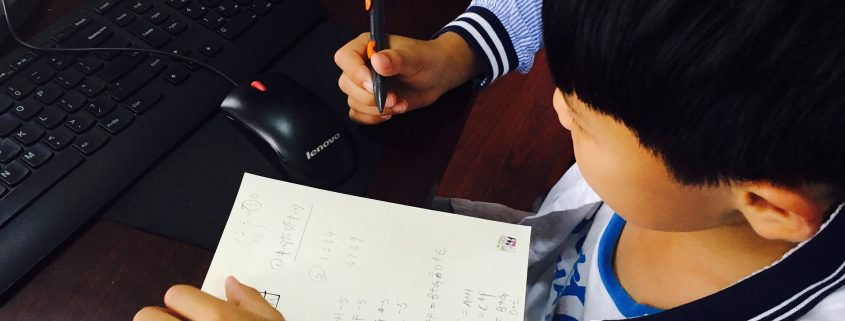How online games help children learn
Researchers have been studying how children learn through games for a long time. Learning about this history can help understand how learning takes place through all types of play and how games can be created with instruction in mind.
A history of Games for Learning
The subject of learning through play predates formal games intentionally designed for teaching, and certainly predates computer games for learning. The definition of games and even play was very different when researchers started studying this topic, and some of the early research focused on imaginative games. They found that imaginative play is important because “we use games to mimic activities and roles for which we need to prepare”. This can include students mimicking family life by playing house, imagining what it might be like to hold a certain profession, or trying different ways to resolve conflict through war games. Additionally, playground games teach valuable skills such as motor skills, problem solving and strategy. Technology has expanded the possibilities for play, but the same basic principles are at work. Let’s consider a few types of online games.
Разбор популярных мифов о казино Gama среди россиян
Казино Gama – одно из самых популярных онлайн-казино среди российских игроков. Однако, вокруг этого заведения циркулирует множество мифов и предрассудков. В данной статье мы проведем разбор наиболее распространенных мифов о казино Gama и выясним, насколько они соответствуют действительности.
Многие люди считают, что играть в казино – это всего лишь пустая тратой времени и денег. Однако, Gama предлагает уникальный игровой опыт, который может изменить ваш взгляд на азартные развлечения. Мы рассмотрим, какие преимущества и возможности предоставляет Gama своим игрокам, а также разоблачим мифы о том, что казино всегда выигрывает и игроки не имеют шансов на успех. Готовы ли вы узнать правду о казино Gama и испытать свою удачу?
Преимущества онлайн-казино Gama: факты и статистика
Казино Gama – одно из самых популярных онлайн-казино среди российских игроков. Однако, существует множество мифов и предрассудков, окружающих это казино. Первым мифом является то, что играть в Gama незаконно. На самом деле, это казино имеет все необходимые лицензии и разрешения, чтобы предоставлять услуги онлайн-гемблинга в России. Оно строго соблюдает все правила и требования, установленные соответствующими органами.
Вторым распространенным мифом является то, что Gama обманывает игроков и не выплачивает выигрыши. Это совершенно неправда. Казино Gama гарантирует честность игры и справедливость выплат. Оно использует проверенные и сертифицированные генераторы случайных чисел, чтобы обеспечить случайный и непредсказуемый результат каждой игры. Кроме того, казино имеет прозрачную систему выплат, которая позволяет игрокам получать свои выигрыши без задержек.
Мифы о безопасности в казино Gama: правда или вымысел?
Казино Gama является одним из самых популярных онлайн-казино среди российских игроков. Но вокруг него существует множество мифов и предрассудков. Разберем некоторые из них.
Миф 1: Gama казино официальный сайт – это мошенничество. На самом деле, Gama казино имеет все необходимые лицензии и сертификаты, подтверждающие его законную деятельность. Сайт казино защищен современными технологиями шифрования, что гарантирует безопасность личных данных игроков.
Миф 2: Gama казино не выплачивает выигрыши. Это совершенно неправда. Gama казино имеет прозрачную систему выплат, и все выигрыши игроков выплачиваются в полном объеме. Казино также предлагает различные способы пополнения и вывода средств, чтобы каждый игрок мог выбрать наиболее удобный для себя.
Миф 3: Gama казино обманывает игроков своими бонусами. На самом деле, бонусная система Gama казино является одной из самых щедрых среди онлайн-казино. Каждый новый игрок может получить приветственный бонус при первом депозите, а регулярные игроки могут участвовать в различных акциях и программе лояльности.
Миф 4: Gama казино нечестно устанавливает свои игровые автоматы. Это абсолютно неправда. Gama казино использует лицензированные игровые автоматы от проверенных разработчиков, которые работают на основе генератора случайных чисел. Это гарантирует честность и непредсказуемость игрового процесса.
Разоблачение мифов о вероятности выигрыша в казино Gama
Казино Gama – одно из самых популярных онлайн-казино среди российских игроков. Однако вокруг этого казино существует множество мифов и предрассудков, которые нужно разбить. Первый миф заключается в том, что играть в казино Gama – это незаконно. На самом деле, казино Gama имеет все необходимые лицензии и действует в соответствии с законодательством, поэтому играть здесь абсолютно легально.
Второй миф связан с безопасностью и честностью игры в казино Gama. Некоторые люди считают, что онлайн-казино могут подделывать результаты игр и манипулировать выплатами. Однако Gama использует передовые технологии и проверенные генераторы случайных чисел, что обеспечивает честность игры и защиту данных игроков. Казино также сотрудничает с независимыми аудиторскими компаниями, чтобы подтвердить свою честность и прозрачность.
Третий миф связан с выводом денег из казино Gama. Некоторые игроки считают, что вывод выигрышей здесь затягивается и процесс может быть сложным. Однако казино Gama предлагает широкий выбор платежных систем и обрабатывает вывод средств оперативно. Выигрыши можно получить на банковскую карту, электронные кошельки или через банковский перевод. Казино также гарантирует конфиденциальность и безопасность финансовых операций.
Четвертый миф заключается в том, что играть в казино Gama – это только для профессионалов. На самом деле, Gama предлагает широкий выбор игр, включая слоты, рулетку, покер и многое другое. Здесь каждый может найти игру по своему вкусу и уровню навыков. Казино также предлагает бесплатный режим игры, чтобы новички могли попробовать свои силы и разобраться в правилах без риска потерять свои деньги.
Популярные заблуждения о игровых автоматах в казино Gama: правда ли они?
Существует множество мифов и предрассудков, связанных с онлайн-казино Gama среди россиян. Однако, многие из них являются ошибочными и не соответствуют действительности. Например, одним из самых распространенных мифов является то, что казино Gama всегда настроены на обман игроков. На самом деле, Gama работает на основе лицензии и строго соблюдает правила честной игры, обеспечивая безопасность и надежность для своих пользователей.
Еще одним распространенным мифом является то, что играть в казино Gama невыгодно и вероятность выигрыша минимальна. На самом деле, Gama предлагает широкий выбор игр с высокими процентами выплат, а также бонусные программы и акции, которые повышают шансы на успех. Кроме того, Gama использует генератор случайных чисел, что обеспечивает абсолютную случайность и честность игрового процесса.
Также существует миф о том, что играть в казино Gama незаконно. На самом деле, в России нет прямого запрета на онлайн-гемблинг, и многие казино, включая Gama, имеют лицензии и работают в соответствии с законодательством. Однако, игрокам следует ознакомиться с правилами и условиями казино, чтобы избежать возможных проблем.
Наконец, миф о том, что играть в казино Gama это чистый случай, и нет возможности разработать стратегию выигрыша. В действительности, многие игры в казино требуют знания и навыков, чтобы повысить свои шансы на успех. Кроме того, Gama предлагает различные варианты игры, что позволяет игрокам выбирать наиболее выгодные для них стратегии и тактики.
В заключение, мы разобрали несколько популярных мифов о казино Gama среди россиян. Благодаря этому разбору, мы можем сделать вывод, что Gama является надежным и честным онлайн-казино, которое предлагает своим игрокам широкий выбор азартных игр, безопасные и удобные методы пополнения счета и вывода средств, а также высокий уровень безопасности и конфиденциальности. Однако, необходимо помнить, что игра в казино – это развлечение, и следует всегда играть ответственно и осознанно, устанавливая лимиты на свои ставки и управляя своим банкроллом. Надеемся, что данный разбор помог вам развеять мифы и сделать осознанный выбор при выборе онлайн-казино Gama.
Repetition and Practice Games
Repetition games are the most straightforward example of learning games. Whether your spelling words to progress in the game’s story or answering math problems to earn points, these games clearly replicate study activities needed for students to be successful. It is unlikely that these players are interested in mimicking study activities but rather, they are motivated by the familiar acts of moving through a story or earning rewards (in this case, points). By mixing these familiar acts with the study tools, game designers are helping students capitalize on the motivation we know game players feel to help them learn.
Puzzle Games
In a way similar to repetition games, puzzle games allow students to build problem solving and strategy skills with the familiar act of solving puzzles. This might include crossword puzzles with vocabulary or spelling words or number games to work on math fluency. Another example is computer games where students solve jigsaw puzzles through completing tasks to earn puzzle pieces. These add complexity to simple repetition games where students use academic content to accomplish other goals.
Conclusion
After looking at a few examples of different types of games it is easier to see how online games help students build their skills. Whether they are mimicking life events they see adults living or learning through engaging story-lines, online games can be a powerful tool to help students learn.




